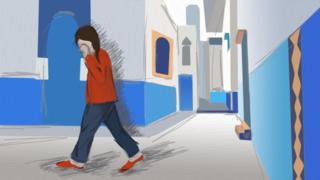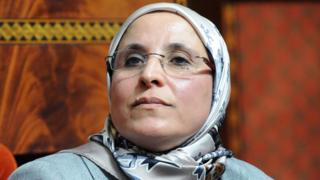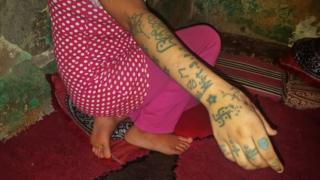 Image caption The law was adopted in Morocco’s parliament in March
Image caption The law was adopted in Morocco’s parliament in March
Morocco’s law criminalising violence against women has come into force.
The law includes a ban on forced marriage, sexual harassment in public places, and tougher penalties for certain forms of violence.
It has been criticised by Human Rights Watch for not explicitly criminalising marital rape and lacking a precise definition of domestic violence.
A government survey found that 63% of women between the ages of 18-65 had been victims of violence.
Africa Live: Find out all the latest news from the continent Moroccan shock at ‘brutal rape ordeal’ Controversial Morocco rape law axed
Samira Raiss, one of the main Moroccan campaigners for a law criminalising violence against women, said: “We will not stop here. This law is an asset but it has shortcomings that we have to work on.”
 Image copyright Getty Images Image caption Bassima Hakkaoui first drafted the law in 2013
Image copyright Getty Images Image caption Bassima Hakkaoui first drafted the law in 2013
Human Rights Watch said the law has some positive aspects, “such as a definition of violence against women to mean ‘any act based on gender discrimination that entails physical, psychological, sexual, or economic harm to a woman’.”
But it contains “major gaps and flaws that leave women at risk of domestic violence, including a lack of provisions to finance the reforms,” HRW says.
Bouthaina Karouri, a member of the parliamentary committee that drafted the law, says these oversights can be fixed.
“No law is perfect” Ms Karouri said.
“Its effectiveness will depend on the approach adopted by the police and the judicial body. As it goes into effect, it is normal to discover some gaps but they can be amended in the future.”
 Image copyright Getty Images Image caption Khadija said her captors forcibly tattooed her and burnt her with cigarettes
Image copyright Getty Images Image caption Khadija said her captors forcibly tattooed her and burnt her with cigarettes
The law comes into effect following last month’s massive outcry over the alleged rape, torture and kidnapping of a 17-year-old girl named as Khadija.
Many went on social media, sharing the hashtag #JusticePourKhadija to describe their disgust and horror and calling on the authorities to take action.
In 2014, Morocco’s parliament amended an article of the penal code that allowed rapists of underage girls to avoid prosecution by marrying their victims.






